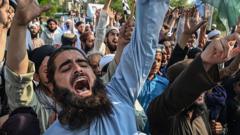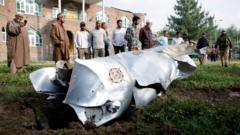As the specter of increased conflict looms, Hindu casualties in Kashmir have ignited serious accusations between India and Pakistan, escalating military tensions.
**Rising Tensions: India and Pakistan After Recent Kashmir Attack**

**Rising Tensions: India and Pakistan After Recent Kashmir Attack**
Indo-Pak Relations Face New Crisis Following Deadly Terror Assault
The tensions between India and Pakistan have reached a boiling point following a devastating terrorist attack in Kashmir last month. Onlookers recounted the horror as a group of attackers emerged from the surrounding forest, targeting a picnic spot where 26 men, predominantly Hindu, were killed, an act witnessed by their families. The relatively tranquil situation that the Indian government hoped to present in Kashmir was shattered, raising troubling questions about security in the region.
The little-known militant group, the Resistance Front, claimed responsibility for the heinous attack. However, the Indian government insists the group acts as a front for a larger network of terrorists operating out of Pakistan. In response, India initiated a series of military strikes against what it perceives as terrorist strongholds in Pakistan. Pakistan, meanwhile, has vehemently denied these allegations, insisting that it does not support terrorist organizations.
The two primary groups India has accused of involvement are Lashkar-e-Taiba and Jaish-e-Muhammad. Lashkar-e-Taiba, founded in the 1980s and already on the United Nations sanctions list since 2005, has a troubling history of orchestrating some of the most notorious terrorist attacks in India, including the 2008 Mumbai attacks, which claimed over 160 lives.
Although Pakistan acknowledges Lashkar-e-Taiba's historical offenses, it maintains that the group was outlawed and has disbanded. Despite this assertion, Indian authorities argue that Lashkar-e-Taiba continues to operate under various aliases and offshoots, including the recently implicated Resistance Front. As military activities intensify and diplomatic relations further deteriorate, the potential for an all-out conflict grows, alarming regional and global observers.



















